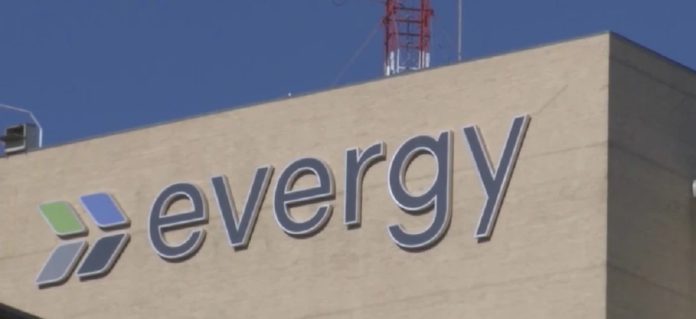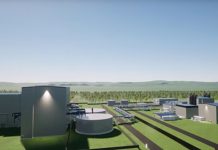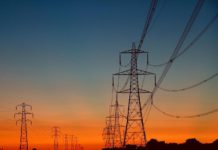Gov. Laura Kelly on Thursday signed a bill that Evergy says will help it attract investor capital needed to meet the demands of new economic development.
The bill, approved unanimously in the House and 33-2 in the Senate, makes changes in the regulatory framework that will generate revenue for Evergy to make certain investments in the grid to accommodate new development.
The bill is about attracting capital investment that Evergy says is needed to build more dispatchable power generation, industry shorthand meaning a resource that can be counted on when it’s needed such as coal, nuclear and natural gas.
Regulators told lawmakers that in the first six years after the bill is enacted, it could result in a rate increase of less than $18 million a year in Evergy’s central territory and less than $6 million a year for the Kansas City area.
Republican state Rep. Leo Delperdang, chair of the House utilities committee, said he believed the bill would space out the time between rate cases.
Without the bill, he said, the utility might bring new rate cases every year. With the bill, it may be every two to three years.
Company officials say that it’s hard to raise capital because Kansas is considered among the worst regulatory jurisdictions in the country, along with Illinois, Maine, Connecticut and Washington, D.C.
“Electrical infrastructure is very important to the state’s economy,” said Chuck Caisley, chief customer officer for Evergy.
“Being able to competitively attract capital to invest in Kansas is important.”
The bill had been initially opposed by a large group of industrial consumers because the legislation didn’t adequately balance retail ratepayer interests with the utility’s.
The group later moved to neutral as the bill was revised during the process.
“Through many negotiating sessions, the parties were able to bring forward a compromise version of the bill that was acceptable,” said Jim Zakoura, the Overland Park attorney who represents the industrial users.
Evergy holds out the promise of the state bringing in new economic development as more capital flows into the state for building the infrastructure needed to serve those new businesses.
In the last three years, 47 projects have located in Evergy’s service area, bringing 12,000 jobs and $7.3 billion in investment, officials said.
The company has more than $13.5 billion in investment and projects that could move to Kansas in the next five years.
The company had signaled that the state could lose business because it takes the utility two to four years to extend service to a large manufacturer.
Evergy officials said the last time new base load power generation was constructed in central Kansas – the old Westar territory – was in 2001.
The last time a new plant was constructed in the Kansas City area was 2010, when a new coal plant was constructed in Weston, Missouri, and across the river from Leavenworth.
They point to a report recently issued by the North American Electric Reliability Corporation – known as NERC – that found the region is at an “elevated risk” of not having enough generation capacity to meet demand, especially in the winter.
The study, they said, suggested that more dispatchable energy production is needed.
There’s already a lot of wind generation in Kansas, they said, but what the region lacks is a sufficient amount of dispatchable power generation, which is decreasing.
Nuclear and coal are largely out of the question, prompting Evergy to look at a new natural gas plant, which takes four or five years to build.
Evergy officials had suggested that the gas plant would go to Missouri if Kansas didn’t move to change the regulatory environment.
The bill started out facing stiff opposition, partly because of a section that would have kept regulators from setting the return on equity – the profit opportunity component of utility rates – that balanced the interests of ratepayers and shareholders.
Regulators said that section of the bill would have required the Kansas Corporation Commission to follow the utility’s choice to use an average of the fully litigated return on equity results from other states over the last 12 months.
The KCC staff said to its knowledge, a bill that allowed a regulated utility to choose its own capital structure for ratemaking purposes did not exist anywhere in the country.
The bill also would have removed regulators’ ability to decide a capital structure for ratemaking purposes.
As part of an agreement, those issues will be handled in a proceeding before the KCC because of their complex nature.
The bill leaves in place a provision that would allow Evergy to defer 90% of the depreciation it incurs between rate cases for investments in the electrical grid and existing power-generation plants.
Those costs would be deferred in a special regulatory account until the next rate case, after which they would be recovered over 20 years.
This section of the bill is limited to existing power generation and distribution as well as information technology and cybersecurity investments.
Further, the bill caps the annual retail rate at 1.5% on investments covered by the legislation.
Justin Grady, deputy director of the KCC’s utilities division, said the actual rate impact of the bill during its first six years will be less than $18 million a year for Evergy’s central territory and less than $6 million a year for the Kansas City area.
When Grady testified on the bill in its original form, he estimated that it would could have cost Evergy ratepayers in Kansas more than $60 million a year if it had been applied to the rate case decided last year.
Grady said the bill’s effect on rates depends on how often Evergy files rate cases, but that the KCC staff does not anticipate the utility hitting the 1.5% rate cap.
The bill also creates a new 10-year discounted electric rate for economic development projects 25 megawatts or larger.
For the first five years, the average discount rate will not exceed 40%, although it can range anywhere from 20% to 50% over the time frame.
For the second five years, the average discount rate will not exceed 20%, although it can range anywhere from 10% to 30% over the time frame.
As part of the compromise, the discounted rates will no longer be deferred and recovered from other customers to make Evergy whole for the discounts.
The difference between the discounted rates and the full rate will no longer be directly recovered from existing customers after a rate case under the revised legislation.
The legislation includes a provision that allows the utility to recover interest and carrying costs for construction of a new natural gas plant through a line item added to the customer’s bill.
The company says this provision would reduce the overall cost of the project and save money. State regulators, under the new bill, can order a refund if the plant isn’t built.
The bill would sunset after six years, although the Kansas Corporation Commission could extend it another six years.
After 12 years, the proposed law would have to be extended by the Legislature.
















